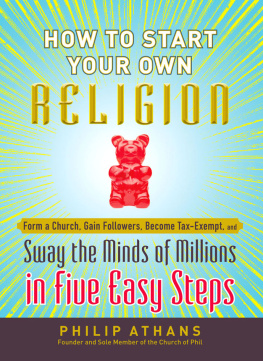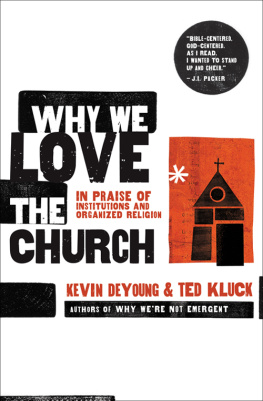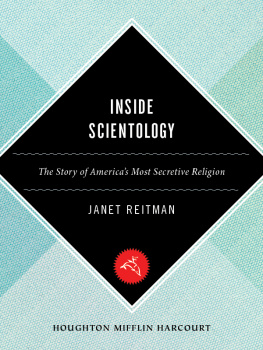CONTENTS
CHAPTER 6. SAMPLE RELIGION 1:
SCHOLARS OF THE PARTICULARLY LONG BOOK
Acknowledgments
The idea for this book came to me from my former boss and current friend Peter Archer, but I will just have to learn to forgive him. Hes actually a really nice guy.
Speaking of bosses, you would not believe me if I told you how much hard work editor Jennifer Lawler put into this thing, and how fast she brought it together. I hope her next author will be less cranky, and that she will learn not to reply to e-mails on Sunday. Nothing good ever comes of that.
And thank you to my mother, who was primarily responsible for my own religious upbringing (for not giving me one), and my father for making me go to the Greek Orthodox church only when my papou was visiting from Boston. Aside from a few key details they were the Mary and Joseph of the Church of Phil.
Foreword
I suppose if youre reading this book youre at least wondering, How hard is it to start a religion? From my experience, the answer is, Not very hard.
I would guess that religious leaders fall into three large groups: the true believers, the con artists, and the accidental leaders. True believers would not be reading this book, which pokes fun at something they feel is deadly serious. This is too bad, because theyre probably the most in need of both structure and absurdity. But one of the major problems with true believers is that theyre at the mercy of their ideas of what the god(s) want them to do. As one true believer said to me, If God says it, then I will do it. If his commandment was that all men should wear pink tutus, I would be at my local ballet supply company looking for a size 38! Its hard to argue with that kind of zeal. And it often leads to decisions that can kill off a religion. The Shakers are a good example. They were a celibate faith that also stopped taking new members in 1965. Its no surprise that as of 2010, the Shakers were down to their last three members.
The con men have it better. They look at their religions as a business. If it makes good tax sense to turn their burgeoning psychology cults into religious cults then thats the road theyll take. If it brings in more revenue to argue that being a renunciate and devoting all your time to the faith is not a more pious direction to go (thus keeping your followers employed), but that tithing 15 percent is a pious decision, then youll have hard-working and well-tithing followers. The downside to being a con man is that con men are well, con men. And that probably means theyre at least a bit sociopathic and likely have problems with delayed gratification. They can get away with ostentatious wealth and violating all of their own commandments for a long time. But it usually comes back to bite them.
The last one is probably more common than you might guess. If you read about New Religious Movements (the PC term that has replaced cults) as much as I do you might notice how often you come across this origin story: Someone started running an encounter group, a study group, or a group therapy session, and suddenly realized they were actually leading a religious movement. Its not a difficult path to stumble down. A group of people who are focused intensely and being self-revealing to each other may find all types of mystical events or truths suddenly appear. They may hear the voice of God, paranormal phenomena (rapping sounds or objects moving) may begin to occur, members may begin to have insights into each other or into the world that seem supernatural. The groups bond grows tighter and they begin to believe that they have a message that needs to be given to the world or perhaps they have a truth that must be protected from the world. Suddenly, you have a full-blown new religion.
If you dont believe me about the ability of a group to produce paranormal phenomena, go research the Philip Experiment. In a nutshell, in the 1970s a group of people consciously decided to create a ghost. They were completely aware that this ghost was made up by the group and yet when contacted via sance the ghost performed as well or better than real ghosts supposedly contacted in other sances. Given that the ghost was fictional, the only explanation for the phenomena was the psychology of the group.
Why is it so easy to create a religion? Because humans need to order their world in the face of far too much information input and the awareness that there is far too much that lies on the other side of the walls of ignorance. H. P. Lovecraft (inspiration for numerous New Religious Movements) had it right when he wrote, we live on a placid island of ignorance in the midst of black seas of infinity, and it was not meant that we should voyage far.
We will take any opportunity we can to find order and sense in our world. And if we can gather a group of people around us who will affirm our vision we will gladly grab hold with both hands. Evolution made us tribal creatures and that desire can easily be placated by a religious movement.
Unfortunately, that same tribal impulse tends to make us place one member of the group in the role of leader (priest, minister, guru, high-poobah). And thats where the trouble always begins. If youre reading this book you may be laughing about the idea of becoming the founder of a new religionbut dont laugh too hard. Its easier than you think, and laughing is no protectiongo look up the Church of the SubGenius, Discordianism, or Thee Temple ov Psychick Youth. If you were to even casually move in that direction you could easily find yourself leading a small ragtag group of people who are looking to you for the next revelation, prophecy, ritual, or rule for living. This might lead to a fleet of Rolls Royces and your own island in the Fijis, but you better not disappoint your followers or they could viciously turn on you. On the other hand, do you really want to be responsible for someone elses life? Personally, I find running my own hard enough.
Anthony Valterra, BA, Religious Studies; MA, Consciousness Studies; briefly an accidental religious leader
INTRODUCTION
So You Want to
Start Your Own Religion
If you have ever observed the power, wealth, and privilege that accrue to leaders and practitioners of certain religions, youve probably thought, You know, I should start my own religion. Then I would be the one who gets to decide if recreational drug use is an acceptable response to the crushing angst of adolescence. Or perhaps you have experienced a loftier sentiment and have toyed with the idea of creating a lasting ethos that will endure through the rest of human history, spreading enlightenment to the unenlightened for all time to come.
Either way, youve come to the right place. In How to Start Your Own Religion, you will discover the five steps youll need to take to become the font of all that is good (or bad, depending). Youll learn everything you need to know to go about establishing a religion, gaining adherents, and running their lives. They will thank you for this by making offerings of money, time, sex, and food (and sex with food) unless youd rather they didnt.












